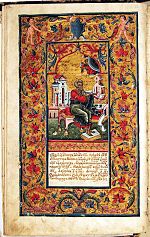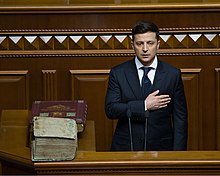Peresopnytsia Gospel
| Peresopnytsya Gospel | |
|---|---|
| Vernadsky National Library of Ukraine, Kyiv | |
 | |
| Also known as | Ukrainian: Пересопницьке Євангеліє |
| Type | Gospel |
| Date | 1556–1561 |
| Language(s) | Ruthenian |
| Scribe(s) | Mykhailo Vasylovych |
| Size | 380 by 240 millimetres (15.0 in × 9.4 in) |
| Discovered | Osip Bodyansky (1830s) |
The Peresopnytsia Gospel (Ukrainian: Пересопницьке Євангеліє, romanized: Peresopnytske Yevanheliie) is a 16th-century manuscript written in the Ruthenian language. It is today held in the Vernadsky National Library of Ukraine. Since 1991, all Ukrainian presidents have taken the oath of office on the Gospel.
History
[edit]The manuscript known as the Peresopnytsia Gospel was made between 15 August 1556 and 29 August 1561 at the Bernardine Monastery, Iziaslav in the Grand Duchy of Lithuania, and the Monastery of the Mother of God in Peresopnytsia (now in Ukraine). The scribe was Mykhailo Vasylovych, the son of an archpriest from Sianik, who worked under the direction of Hryhorii, the archimandrite of the Peresopnytsia Monastery.[1]
The Peresopnytsia Gospel contains the four Gospels of the New Testament. It is ornamented with Cyrillic[a] characters, which were influenced by the Italian Renaissance style. It is the first known example of a Ruthenian (Old Ukrainian) translation of the canonical text of the Scriptures.[1][5][6]
The Gospel was commissioned by Anastasia Yuryivna Zaslavska, an Orthodox princess from Volyn, and her daughter and son-in-law Yevdokiya and Ivan Fedorovych Czartoryski.[citation needed]
After its completion, the book was kept in the Peresopnytsya Monastery. On 17 April 1701, it was presented to Pereyaslav Cathedral by Ivan Mazepa, the hetman of Ukraine. Scholar Osip Bodyansky discovered the book at the Pereyaslav Seminary and published a paper on the subject. Later on it was held in the Poltava Seminary, Poltava Museum of History and Regional Studies, Kyiv Pechersk Lavra preserve. On 24 December 1948, it was placed at the Vernadsky National Library of Ukraine.
Ukrainian presidential oath of office
[edit]
All six Ukrainian presidents since 1991 have taken the oath of office on the Gospel: Leonid Kravchuk (1991), Leonid Kuchma (1994), Viktor Yushchenko (2005), Viktor Yanukovych (2010), Petro Poroshenko (2014), and Volodymyr Zelenskyy (2019).[7]
On 9 November 2010, on the Day of Ukrainian Writing and Language, ADEF-Ukraine publishing house (located in Kyiv) presented the Peresopnytske Evangelie edition. Origins and present.[8] The book contains reduced facsimile copies of images of the original texts, the original text transliterated into the modern Ukrainian Cyrillic alphabet (with the addition of a little more than ten letters from the Church Slavonic Cyrillic alphabet) and a translation of the Peresopnytskyi Gospel into modern Ukrainian.[9][10][11]
See also
[edit]Notes
[edit]- ^ The claim that these are Glagolitic characters is now widespread, but absent from academic literature. It traces back to the first version of this Wikipedia article.[2] The editor responsible relayed the claim from the Dan's Topical Stamps website.[3] The erroneous claim even made it into the Library of Congress description of a book on the manuscript by Aleksandr Sergeevič Gruzinskij, likely as a result of reliance on the Wikipedia article given the absence of such a claim in the book itself.[4]
References
[edit]- ^ a b "Ukraine - Peresopnytsia Gospel (Peresopnitske Yevanhelije). 1556-1561". Memory of the World. UNESCO. 2005. Archived from the original on 12 March 2007. Retrieved 1 March 2024.
- ^ Perceval (2005-01-27). "Peresopnytsia Gospel". Wikipedia.
- ^ Dan. "Peresopnytsia Gospel". Archived from the original on 2003-08-24.
- ^ Library of Congress (2021). "Peresopnytsia Gospel, a Monument of the 16th Century Renaissance Art from South Russia".
- ^ Hosking, Geoffrey A. (23 September 1991). Church, Nation and State in Russia and Ukraine. Springer. p. 1. ISBN 978-1-349-21566-9.
- ^ Plokhy, Serhii; Sysyn, Frank E. (2003). Religion and Nation in Modern Ukraine. Canadian Institute of Ukrainian Studies Press. p. 2. ISBN 978-1-895571-45-5.
- ^ Lurie, Max (5 May 2019). ""Брать пример с Израиля": чем удивил Зеленский на инаугурации" [“Taking an example from Israel”: what surprised Zelensky at the inauguration]. Vesty (in Russian). Yedoth Internet. Archived from the original on 19 August 2019. Retrieved 20 May 2019.
- ^ Gladska, Lyudmila (10 November 2010). "У Бучі надрукували перший аркуш Пересопницького Євангеліє" [The first page of the Peresopnytskyi Gospel was printed in Bucha]. Bucha (in Ukrainian). Archived from the original on 28 January 2013. Retrieved 4 July 2022.
- ^ "Національний проект «Рукопис XXI сторіччя» від видавничого дому «АДЕФ-Україна»]. comin.kmu.gov.ua" [National project "Manuscript of the XXI century" from the publishing house "ADEF-Ukraine"] (in Ukrainian). State Committee of Television and Radio Broadcasting of Ukraine. 16 August 2011. Archived from the original on 17 October 2020.
- ^ Konstantiova, Kateryna (6 December 2013). "Директор "АДЕФ-Україна" Алла Істоміна: "Про те, як видавали "Пересопницьке Євангеліє", можна написати детектив"" [Director of "ADEF-Ukraine" Alla Istomina: "You can write a detective story about how the "Peresopnytsk Gospel" was published"] (in Ukrainian). Mirror of the Week. Archived from the original on 17 October 2020. Retrieved 1 March 2024.
- ^ Tsymbaliuk, Evgeny; Yurkova, Oleksandra (4 August 2011). "Оригінал — у книгосховищі, факсиміле розходяться по світу" [The original is in the book depository, facsimiles are scattered around the world] (in Ukrainian). Voice of Ukraine. Archived from the original on 17 October 2020. Retrieved 1 March 2024.
Further reading
[edit]- "Peresopnytsia Gospel". Internet Encyclopaedia of Ukraine. Canadian Institute of Ukrainian Studies. Retrieved 1 March 2024.
- Plokhy, Serhii (1999). "Church, State and Nation in Ukraine". Occasional Papers on Religion in Eastern Europe. 19 (5). George Fox University: loc=article 2. ISSN 2693-2229.
External links
[edit]- Peresopnytsya Gospel Treasure of the National Library of Ukraine, displayed via The European Library
- Article about a copy of the Gospel being donated to the Vatican from the Religious Information Service of Ukraine
- Information about a copy of Alexander Gruzinskii's Peresopnytsia Gospel, a Monument of the 16th Century Renaissance Art from South Russia (1911) from the Library of Congress
- Information about the Gospel from the National Technical University of Ukraine
- An article about the Gospel (Kyiv Post)


